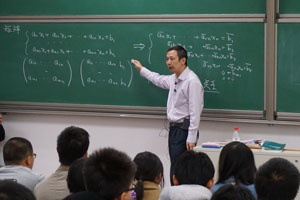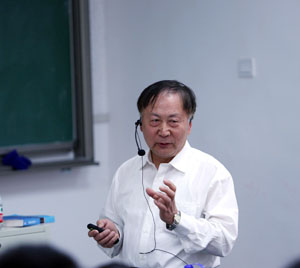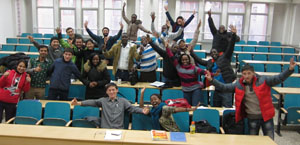

Members of the Chinese Academy of Sciences (CAS) began teaching undergraduates of the University of Chinese Academy of Sciences (UCAS) after its first enrollment of more than 300 undergraduate students last year.
Every Tuesday and Friday, Xi Nanhua, a 52-year-old academic acts as a math teacher only, leaving behind all other important roles—co-president of the Academy of Mathematics and Systems Science, vice-president of UCAS, and vice president of the Chinese Mathematical Society. His students are UCAS freshmen.
Teaching undergraduate students remains a challenge for Xi. Despite remarkable accomplishments in the academic arena, Xi had only a two-year experience of teaching undergraduate students in the United States. As a result, he treats his students with prudence and awe that he has in conducting scientific research.

Photo by University of Chinese Academy of Sciences

Photo by Yang Tianpeng

Photo by Yang Tianpeng
Open, humorous and insightful
In developed countries, it is common for Nobel laureates, CAS members and accomplished scholars to give lessons to undergraduate students, so as China’s Tsinghua University, Peking University and Zhejiang University.
With over 1,000 members and more than 100 research institutes of CAS, the UCAS has a great advantage of unique resources to cultivate future scientists.
To Liu Yihao, a computer science and technology major student, CAS members are open, humorous and insightful. “They never spoon-feeding but use many easy-to-understand examples to help us learn.” Liu said.
In late April, Stephen Hawking, a world-renowned physicist, unexpectedly made headlines entertainment news. While giving a lecture at the Sydney Opera House via hologram, Hawking was asked a question about the cosmological effect of Zayn Malik’s out of “One Direction Band”.
Hawking answered the question using the “parallel universe” concept, suggesting that a heartbroken young girl may find Malik remain with the boy band in another universe and that Malik can even be “happily married” with her in yet another possible universe.
Similar scenes can be seen in Xi’s classes. When teaching advanced math, Xi compares solving linear equations to looking for a relationship.
CAS members have a wide range of knowledge, which allows them to explain profound theories with simple words. They help students gain a clearer understanding of a subject and its context, contributing to in-depth understanding and research in that field.

Photo by University of Chinese Academy of Sciences
Answering questions with action
Earlier, the idea of CAS members teaching undergraduate students aroused heated debate. Some believed that CAS members’ lectures would be boring and difficult to understand, and had little obvious benefit to undergraduate education. Others regarded the initiative as wasting high-level talents or worried that CAS members would be burdened with responsibilities no different than ordinary teachers in terms of teaching. Even some people questioned: “Is it just a tactic to attract enrollment?”
Actions speak louder than words, and now all doubts have disappeared. Currently, four CAS members, including Xi, are teaching undergraduate students at the UCAS. The other three are Yuan Yaxiang, Ouyang Qi and Li Yongfang, who teach calculus, physics and chemistry, respectively.
Indeed, CAS members are very busy.
In early May, a text message about Yuan’s tight schedule was forwarded among many UCAS undergraduate students:
Freshman calculus classes at 8:00 am on May 11 made him fly back to Beijing at 3:00 am from Fuzhou. After class ended, he immediately flied to Shanghai to attend a China-European Union meeting, where he delivered a report. After which he returned to Beijing for another undergraduate class on the morning of May 13.
The message inspired everyone to appreciate CAS members’ hard work and effort and be proud of having such diligent and intelligent people as mentors.
For CAS members like Yuan, the word “teacher” means responsibility and obligation.
Although Yuan has mentored postgraduate students for more than 20 years, it was the first time he had ever taught undergraduate students. To prepare for his class, Yuan had discussions with a French scholar and friend, sending and receiving a total of more than 20 e-mails.
To CAS Vice-President and UCAS President Ding Zhongli, the move has endowed China’s top scientists with the mission of passing on knowledge, enlightenment, and scientific traditions.
Teaching would-be scientists to be modest
Yang Yang still remembers the first lesson he attended by the academic Li Yongfang.
Li shared his life and study experiences with his students, telling them how he had grown from a village boy to a chemist through hard work.
Li remains modest and often recommends his students some books and articles written by other scientists in fields which he has not conducted in-depth research on.
Xi said more and more CAS members would give lessons to undergraduate students in the future.
Selected members must meet certain criteria, such as being active in research, of an appropriate age, and with strong abilities of expression and teaching, according to Xi.
Xi started his first undergraduate class in the new semester with a well-known story about German mathematician David Hilbert.
Hilbert once asked one of his students which field the student was good and bad at, respectively. On examination day the student obscured why he questioned his “bad” field rather than the “good” one. Hilbert replied: “I want to know how much progress you have made in the field that you think you’re not good at, so that you can work hard to grasp the rest of the field.”
Also, Xi argues that scores are not so important as one thinks. Being aware of what one has learned and what one needs to make greater effort in is more helpful to those who want to make academic progress.
“As would-be scientists, I hope you all keep more of the ‘ordinary day’ attitude,” Xi said.